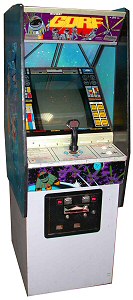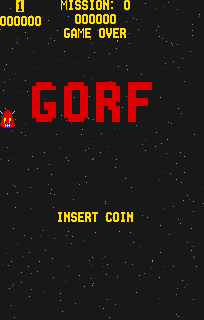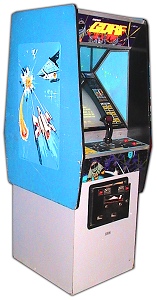 The Game: The evil Gorfian Empire is attacking, and for only a quarter, you can enlist and defend Earth against the vicious (yet strangely cute) little critter with a robotic voice. In the first stage, Astro Battle, you have a defesive shield which is weakened with each shot the aliens fire at you – and every shot you fire back at them. (Truth be told, it’s a very thinly disguised take on the Space Invaders formula.) Then, in the Laser Attack level, the aliens break out heavier, nastier artillery that you have to dodge…if you can. Stage 3 sees a guest star from an earlier Midway game in the Galaxians stage, which is a sort of scaled-down version of the Galaxian game itself. Stage 4 is the hardest, with the Gorfian menace repeatedly spiraling out of a Space Warp, defying you to get so much as a single good shot fired off at it. Finally, if you survive the fourth stage, the Flagship level awaits. The flagship can fire any number of projectiles in your direction through your shield, and you have to not only dodge incoming fire, but try to get your own shot to hit just the right place on the flagship to destroy it. (Bally/Midway, 1981)
The Game: The evil Gorfian Empire is attacking, and for only a quarter, you can enlist and defend Earth against the vicious (yet strangely cute) little critter with a robotic voice. In the first stage, Astro Battle, you have a defesive shield which is weakened with each shot the aliens fire at you – and every shot you fire back at them. (Truth be told, it’s a very thinly disguised take on the Space Invaders formula.) Then, in the Laser Attack level, the aliens break out heavier, nastier artillery that you have to dodge…if you can. Stage 3 sees a guest star from an earlier Midway game in the Galaxians stage, which is a sort of scaled-down version of the Galaxian game itself. Stage 4 is the hardest, with the Gorfian menace repeatedly spiraling out of a Space Warp, defying you to get so much as a single good shot fired off at it. Finally, if you survive the fourth stage, the Flagship level awaits. The flagship can fire any number of projectiles in your direction through your shield, and you have to not only dodge incoming fire, but try to get your own shot to hit just the right place on the flagship to destroy it. (Bally/Midway, 1981)
Memories: Gorf was a minor hit in its time, though this latest attempt to turn the Galaxian format into a franchise fell through the cracks. It didn’t help that the first stage seen in the attract mode was a Space Invaders clone.
 Gorf has an important place in video game history – hitting the arcades shortly before Nintendo’s Donkey Kong did, Gorf was the first coin-op to feature different challenges for each level of the game, rather than keeping the same playing field and just upping the difficulty level. This was quite a programming feat for its day (and incidentally, one of the desginer/programmers who worked on Gorf was Jay – later Jamie – Fenton, who also designed the Bally Professional Arcade console, as well as other arcade games). Early in its gestation, Gorf was actually intended to be a movie tie-in: Midway hoped to license the name and artwork of Star Trek: The Motion Picture and release Gorf under that
Gorf has an important place in video game history – hitting the arcades shortly before Nintendo’s Donkey Kong did, Gorf was the first coin-op to feature different challenges for each level of the game, rather than keeping the same playing field and just upping the difficulty level. This was quite a programming feat for its day (and incidentally, one of the desginer/programmers who worked on Gorf was Jay – later Jamie – Fenton, who also designed the Bally Professional Arcade console, as well as other arcade games). Early in its gestation, Gorf was actually intended to be a movie tie-in: Midway hoped to license the name and artwork of Star Trek: The Motion Picture and release Gorf under that  name. A hint of that plan can be seen in the Flag Ship stage, whose enemy mothership resembles an upside-down Enterprise. Given that this would seem to indicate that the player would’ve been fighting the Enterprise, one wonders what the object of the game would have been.
name. A hint of that plan can be seen in the Flag Ship stage, whose enemy mothership resembles an upside-down Enterprise. Given that this would seem to indicate that the player would’ve been fighting the Enterprise, one wonders what the object of the game would have been.
Gorf also had a voice chip – the same one used in Midway’s Wizard Of Wor – and would mutter semi-unintelligible threats to you in a robot voice. You couldn’t tell what the hell it was saying half the time, but the novelty value was the key.
 Numerous home versions of Gorf were licensed out by Midway, but none of them featured all of the arcade game’s screens; word has it that Namco wasn’t thrilled by the “unauthorized” inclusion of Galaxian characters and play mechanics in Gorf, so that screen quitely disappeared from the home console ports.
Numerous home versions of Gorf were licensed out by Midway, but none of them featured all of the arcade game’s screens; word has it that Namco wasn’t thrilled by the “unauthorized” inclusion of Galaxian characters and play mechanics in Gorf, so that screen quitely disappeared from the home console ports.
